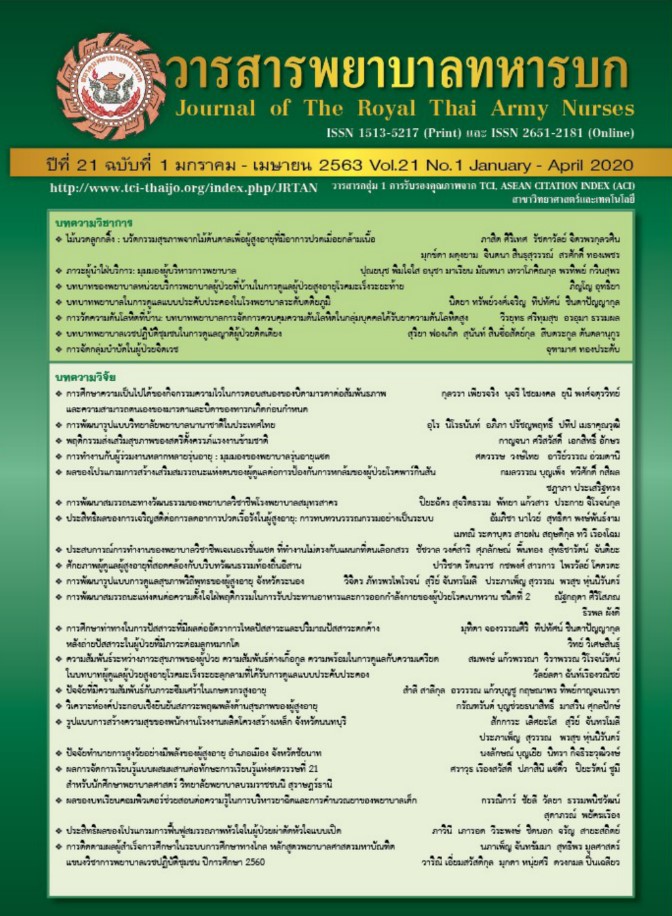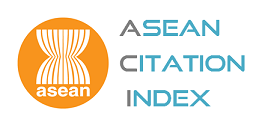ผลของโปรแกรมการบำบัดความคิดและพฤติกรรมต่ออาการซึมเศร้าของวัยรุ่นที่ถูกทารุณกรรม
คำสำคัญ:
วัยรุ่นที่ถูกทารุณกรรม, อาการซึมเศร้า, โปรแกรมการบำบัดความคิดและพฤติกรรมบทคัดย่อ
การวิจัยกึ่งทดลองนี้ เพื่อศึกษาผลของโปรแกรมการบำบัดความคิดและพฤติกรรมต่ออาการซึมเศร้าของวัยรุ่นที่ถูกทารุณ กรรม กลุ่มตัวอย่างคือ วัยรุ่นที่ถูกทารุณกรรมและเข้าพักอยู่ในสถานสงเคราะห์เด็ก เขตภาคกลาง อายุ 15 – 18 ปี โดยสุ่มอย่างง่าย สถานสงเคราะห์เด็กชายและเด็กหญิงอย่างละ 1 แห่ง เป็นกลุ่มทดลองได้รับโปรแกรมการบำบัดความคิดและพฤติกรรม และเป็น สถานสงเคราะห์เด็กชายและเด็กหญิงอย่างละ 1 แห่ง เป็นกลุ่มควบคุมได้รับการดูแลตามปกติ จากสถานสงเคราะห์ 7 แห่ง และสุ่ม อย่างง่ายวัยรุ่นที่มีคุณสมบัติตามเกณฑ์ที่กำหนดจากสถานสงเคราะห์กลุ่มทดลองและกลุ่มควบคุมเข้ากลุ่ม ๆ ละ 30 คน เครื่องมือ ที่ใช้ในการวิจัย คือ 1) แบบประเมินอาการซึมเศร้า 9Q 2) แบบสอบถามข้อมูลส่วนบุคคล แบบสอบถามประสบการณ์และระยะ เวลาที่ถูกทารุณกรรม 3) โปรแกรมการบำบัดความคิดและพฤติกรรม 4) แบบวัดอาการซึมเศร้า Center for Epidemiological Studies-Depression Scale (CES-D) ฉบับภาษาไทย โดยโปรแกรมการบำบัดความคิดและพฤติกรรมผ่านการตรวจสอบความตรง เนื้อหา ความถูกต้องชัดเจนของภาษา ความเหมาะสมของกิจกรรมจากผู้ทรงคุณวุฒิ 3 ท่าน แบบประเมินอาการซึมเศร้า 9Q และ แบบวัดอาการซึมเศร้า CES-D ฉบับภาษาไทยมีค่าเที่ยงสัมประสิทธิ์แอลฟาครอนบาคเท่ากับ .82 และ .86 วิเคราะห์ข้อมูลโดยใช้ สถิติพรรณนา สถิติทดสอบทีชนิดไม่เป็นอิสระต่อกัน (Dependent t-test) และสถิติทดสอบทีชนิดเป็นอิสระต่อกัน (Independent t-test)
ผลการวิจัยพบว่า ค่าเฉลี่ยคะแนนอาการซึมเศร้าในกลุ่มทดลอง หลังได้รับโปรแกรมต่ำกว่าก่อนได้รับโปรแกรมอย่างมีนัย สำคัญทางสถิติ (p<.001) และผลต่างของค่าเฉลี่ยคะแนนอาการซึมเศร้าก่อนและหลังได้รับโปรแกรมระหว่างกลุ่มทดลอง และกลุ่ม ควบคุมมีความแตกต่างกันอย่างมีนัยสำคัญทางสถิติ (p<.001) แสดงว่า โปรแกรมมีประสิทธิผลในการช่วยลดอาการซึมเศร้าให้กับ วัยรุ่นที่ถูกทารุณกรรมได้
Downloads
เอกสารอ้างอิง
Department of Children and Youth. Statistics of abused children admitted to children and family homes under the Department of Child and Youth. 2018. (In Thai)
Leeb, R. T., Lewis, T., and Zolotor, A. J. 2011. A review of physical and mental health consequences of child abuse and neglect and implications for practice. American Journal of Lifestyle Medicine, 5(5), 454-468.
Thapar, A., Collishaw, S., Pine, D. S., and Thapar, A. K. 2012. Depression in adolescence. The Lancet, 379(9820), 1056-1067.
Melvin, G. A., Dudley, A. L., Gordon, M. S., Ford, S., Taffe, J., and Tonge, B. J. 2013. What happens to depressed adolescents? A follow-up study into early adulthood. Journal of affective disorders, 151(1), 298-305.
Podchana, P. 2014. Depressive disorder: Nurse’s role in nursing care. Journal of The Royal Thai Army Nurses, 15(1), 18-2. (In Thai)
Benjamaporn, R., Nujjaree, C., Wannee, D. 2014. Predictors of Suicidal Ideation among Thai Adolescents. Journal of The Royal Thai Army Nurses, 18(1), 64-73. (In Thai)
Habigzang, L. F., Damásio, B. F., and Koller, S. H. 2013. Impact evaluation of a cognitive behavioral group therapy model in Brazilian sexually abused girls. Journal of child sexual abuse, 22(2), 173-190.
Barron, I. G., Abdallah, G., and Smith, P. 2013. Randomized control trial of a CBT trauma recovery program in Palestinian schools. Journal of Loss and Trauma, 18(4), 306-321.
Boals, A., and Murrell, A. R. 2016. I am> trauma: Experimentally reducing event centrality and PTSD symptoms in a clinical trial. Journal of loss and trauma, 21(6), 471-483.
Steinberg, L., and Morris, A. S. 2001. Adolescent development. Annual review of psychology, 52(1), 83-110.
Malisa, N., Nittaya, T., and Suparachao, P. 2014. The Effect of a Cognitive Behavior Therapy Program on Depression among Adolescents in One Juvenile Training Center in the North East of Thailand. Nursing Journal, 41(4), 36-47. (In Thai)
Beck, J. S. 2011. Cognitive behavior therapy: Basics and beyond. New York: Guilford.
Grove, S. K., Burns, N., and Gray, J. 2014. Understanding nursing research: Building an evidence-based practice. Elsevier Health Sciences.
Allison, A. C., and Ferreira, R. J. 2017. Implementing cognitive behavioral intervention for trauma in schools (CBITS) with Latino youth. Child and adolescent social work journal, 34(2), 181-189.
ดาวน์โหลด
เผยแพร่แล้ว
รูปแบบการอ้างอิง
ฉบับ
ประเภทบทความ
สัญญาอนุญาต
บทความหรือข้อคิดเห็นใดใดที่ปรากฏในวารสารพยาบาลทหารบกเป็นวรรณกรรมของผู้เขียน ซึ่งบรรณาธิการหรือสมาคมพยาบาลทหารบก ไม่จำเป็นต้องเห็นด้วย
บทความที่ได้รับการตีพิมพ์เป็นลิขสิทธิ์ของวารสารพยาบาลทหารบก
The ideas and opinions expressed in the Journal of The Royal Thai Army Nurses are those of the authors and not necessarily those
of the editor or Royal Thai Army Nurses Association.







